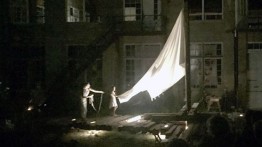look now away closely
Tuesday, September 8, 2015, 7 - 8:30pm

Image from the performance 'Galapagos Now:' Arts Letters & Numbers. Courtesy of David Gersten
In a free, public lecture entitled "look now away closely," David Gersten, professor at The Irwin S. Chanin School of Architecture, will address questions of transformation from a number of perspectives, specifically looking at the interdependence of our conceptions of risk and our spaces of education.
"Today, in these early days of the 21st century, the ubiquitous observation is transformation: Cultural, technological, biological, social, political, economic and ecological transformation. We are in the midst of unprecedented re-alignments and re-articulations of every aspect of our lives. Perhaps our greatest risks are not individual threats or even multiple agents creating specific hazards towards specific vulnerabilities. Perhaps our greatest risks today lie in our capacity to comprehend transformation. Education in the broadest sense holds the capacity of developing new pathways of interaction and forms of knowledge that address the challenges of our increasingly complex world."
-- d.gersten
David Gersten is an architect, artist, writer and internationally recognized educator based in New York City. He has been a Professor in The Irwin S. Chanin School of Architecture of The Cooper Union, since 1991, where he has served as the Associate Dean under Dean John Hejduk and the Acting Dean of the School of Architecture. Gersten is the founding Director of Arts Letters & Numbers, a non-profit arts and education organization dedicated to creating new structures and spaces for creative exchange across a wide range of disciplines including: Architecture, Visual Arts, Theater Arts, Film, Music, Humanities, Sciences and Social Sciences. He has lectured and been a visiting professor at numerous universities and cultural institutions through out the world. Gersten’s works include: buildings, drawings, stories, essays, films, performances and constructions. His works have appeared in numerous international exhibitions and performance spaces and are held in the collection of the Canadian Center for Architecture, the New York City Public Library’s print collection and many private collections. He has published extensively in national and international publications on diverse areas of research including: The spaces and structures of education, emergent disciplinary geographies, the financial markets and collective judgment, nuclear weapons and debt, global resource distribution, ethics and technology, the poetic / material imagination, social justice and the linkages between: embodied experience, memory, perception, language and space. Gersten is a graduate of The Irwin S. Chanin School of Architecture of The Cooper Union. He has also pursued studies in phenomenology at the New School for Social Research as well as Islamic Studies at the Jewish Theological Seminary.
The Interdisciplinary Seminar, sponsored by the The Cooper Union School of Art, presents a series of free, public lectures reflecting a broad range of contemporary art issues. Speakers include artists, writers, and thinkers currently engaged in a variety of practices. The emphasis is on interdisciplinary approaches, presenting new voices, international perspectives and scholarship across multiple fields. The series constitutes a lively forum for the exchange of ideas between practitioners, students, faculty and the public.
Located in the Frederick P. Rose Auditorium, at 41 Cooper Square (on Third Avenue between 6th and 7th Streets)




